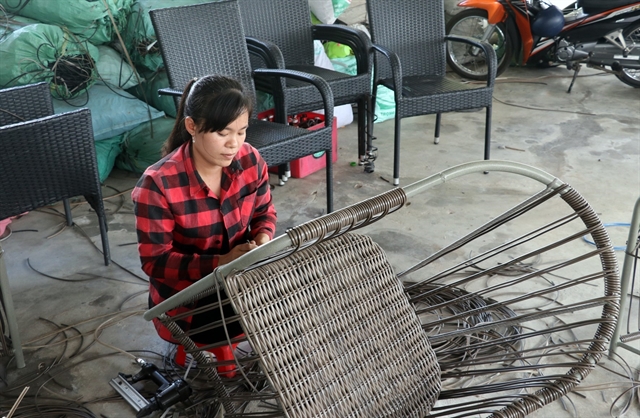 Society
Society

The Cửu Long (Mekong) Delta province of Kiên Giang will spend VNĐ16 billion (US$700,000) to provide vocational training to its workforce this year.

|
| Weaving chairs in a handicraft village in Vĩnh Phong Commune in Kiên Giang Province’s Vĩnh Thuận District. – VNA/VNS Photo Lê Huy Hải |
KIÊN GIANG – The Cửu Long (Mekong) Delta province of Kiên Giang will spend VNĐ16 billion (US$700,000) to provide vocational training to its workforce this year.
Women, people in rural areas and those with disabilities attending training courses of less than three months will have their fees fully subsidised.
People with disabilities, beneficiaries of the Government’s preferential policies, ethnic minorities, poor and near-poor people, those whose farmlands are taken for public works, women who lose their jobs, and fishermen will be given priority for the subsidies.
They will be followed by people living in rural areas or work in industrial parks, tourism areas, small- and medium-sized companies, and former prisoners.
They will also have the cost of travel and food subsidised for attending the training.
The province Department of Agriculture and Rural Development will review the requirements for vocational skills, especially in the agricultural sector.
In the agricultural sector, training will be provided in 60 different vocations like growing vegetables, organic vegetables, fruits, sugarcane, pineapple, and pepper; breeding livestock; aquaculture; producing rice seeds; fishing; and forest-related work.
In other sectors, more than 160 vocations will be covered, including making handicrafts, tourism services, cooking, driving, industrial sewing, and processing of agricultural, forestry and seafood products.
The province will also offer support to trainees in finding a job after training, provide soft loans to carry on agriculture and related businesses and solicit investment in agriculture and rural development to create jobs.
Kiên Giang, which is the country’s largest rice producer, hopes to provide training to 27,000 people in rural areas in 2021- 30, according to its Department of Agriculture and Rural Development.
It targets increasing its rate of trained workers to 75 per cent by 2025. – VNS